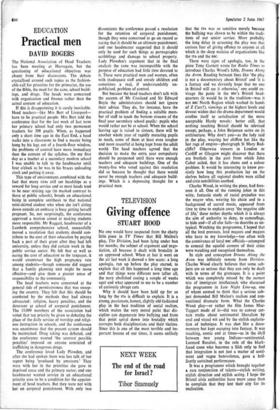Practical men
EDUCATION DAVID ROGERS
The National Association of Head Teachers has been meeting at Harrogate, but the questioning of educational objectives was absent from their discussions. The debate crystallised around such topics as the fashion- able call for priorities for the primaries, the use of the Bible, the need for the cane, school build- ings, and drugs. The heads were concerned with organisation and finance rather than the actual content of education.
If this is disappointing it is surely inevitable. Head teachers—like Mrs Bert of Liverpool— have to be practical people. Mrs Bert told the conference that for the last week of last term her primary school had only two permanent teachers for 308 pupils. When, as happened only a short time ago in the East End, a head walks into a classroom to find a master being hung by his legs out of a fourth-floor window, the problems of control have more immediacy than the content of the syllabus. On my first day as a teacher at a secondary modern school I was unable to talk to the headmaster until four o'clock as he was in his braces unloading stock and putting it away.
This type of environment, combined with the fact that many LEAS still see headships as a reward for long service and so most heads tend to be near retiring age (in marked contrast to those at public schools), breeds an educational being in complete antithesis to that national mini-skirted student who when she isn't sitting down outside an embassy is busy getting herself pregnant. So, not surprisingly, the conference approved a motion aimed at making students more responsible. Mr Raggatt, headmaster of a Lambeth comprehensive school, successfully moved a resolution that students should con- tribute to the cost of their education by paying back a part of their grant after they had left university, unless they did certain work in the public service sector. He felt that as well as easing the cost of education to the taxpayer, it would counteract the high pregnancy rate among students—though someone did suggest that a family planning unit might be more effective—and give them a greater sense of responsibility to the community.
The head teachers were concerned at the general tide of permissiveness that was sweep- ing the country. They felt that this should be combated by the methods they had always advocated: religion, heavy penalties, and the deterrent at school of corporal punishment. The 15,000 members of the association had voted that top priority be given to debating the place of the daily service of worship and religi- ous instruction in schools, and the conference was unanimous that the present system should be maintained. Drug taking was debated, and the conference wanted 'the severest possible penalties' imposed on anyone convicted of trafficking in dangerous drugs.
The conference loved Lady Plowden, and after she had spoken there was less talk of her report being 'produced by amateurs.' They were with her in the priorities she gave to deprived areas and the primary sector, and one headmaster wanted service in an educational priority area to be a condition for the appoint- ment of head teachers. But they were not with her on corporal punishment. With only two
dissentients the conference passed a resolution for the retention of corporal punishment, though they were concerned to go on record as saying that it should be an ultimate punishment, and one headmaster suggested that it should only be used for such things as pornographic scribblings and damage to school property. Lady Plowden's argument that in the final analysis the cane was incompatible with the purpose of education had little time devoted to it. These were practical men and women, often with inadequate staff and unruly children and sometimes a real, if understandably un- publicised, problem of control.
But because the head teachers don't talk with the accents of Mr Crosland and Sir Edward Boyle the administrators should not ignore their advice. They do, for instance, have the practical problem of finding a suitable mem- ber of staff to teach the bottom streams of the final year secondary school pupils: pupils who would rather not be at school. When the school leaving age is raised to sixteen, there will be another whole year of rapidly maturing pupils to teach, some of them at least even tougher and more resentful` at being kept from the adult world. The head teachers agreed that the decision to make the extra year compulsory should be postponed until there were enough teachers and adequate buildings. One of the twenty-five who voted against this resolution did so because he thought that there would never be enough teachers and adequate build- ings. Which is a depressing thought for a practical man.


































 Previous page
Previous page